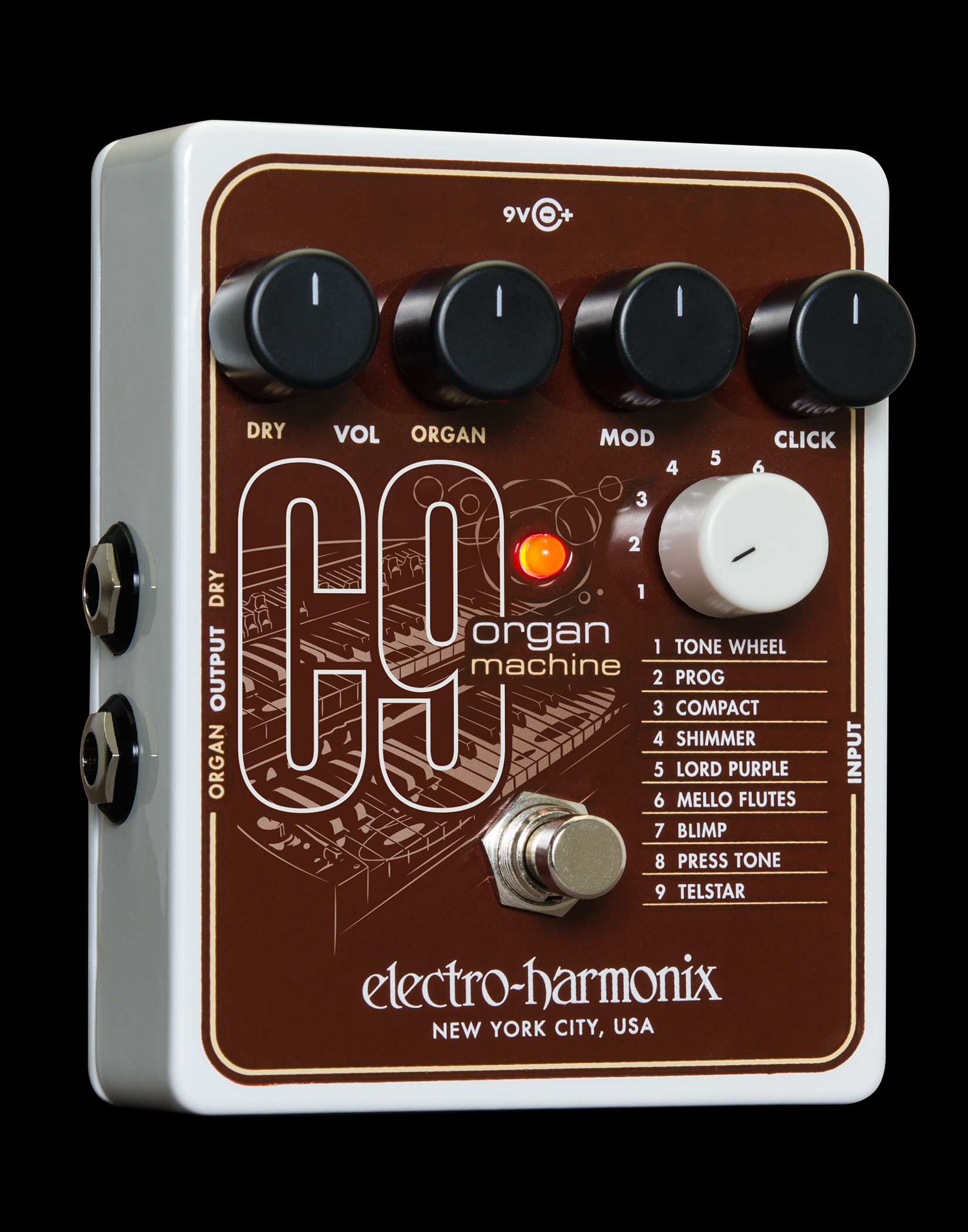Review: Electro-Harmonix C9 Organ Machine Pedal — Video

GOLD AWARD WINNER
The sound of a Hammond B3 plugged into a raging Marshall stack is one of the most awesome sounds in rock besides the guitar.
Jon Lord’s work with Deep Purple remains a supreme example, as the does the playing of Rick Wakeman with Yes, Keith Emerson with Emerson, Lake & Palmer and numerous other players from the prime halcyon days of progressive rock.
Guitarists who wanted to tap into this energy without learning to play keyboards had to rely on expensive guitar synthesizer setups, but now Electro-Harmonix has come up with an affordable and extremely easy-to-use solution with their C9 Organ Machine stomp box.
FEATURES First it should be noted that Electro-Harmonix introduced the B9 Organ Machine about six months before the C9. The main difference between the two is a different set of organ sounds, so if you’re interested I recommend trying both to determine which sounds you like best.
The C9 offers nine different organ sound presets, which consist of various Hammond, Farfisa, Vox, Clavioline and even Mellotron-style tones. The pedal features a mono input and separate output jacks for the dry guitar and processed organ signals. The Dry knob adjusts the dry volume level, while Organ adjusts the organ volume level. A Mod knob varies the speed of modulation, and the Click knob controls, depending upon the preset selected, the percussive “key click” sound that is essential to many rock organ sounds as well as modulation depth, and upper drawbar volumes.
PERFORMANCE Unlike a guitar synth, which can require meticulous and laborious set up to be used effectively, the C9 Organ Machine is a true plug-and-play device. Guitarists need to think like keyboardists to obtain the most realistic organ-like results, but the pedal tracks extremely well with barely perceptible latency as long as notes are played cleanly. You can even use techniques like tapping, although playing harmonics or pick squeals can create some rather unpredictable and unusual effects. The notes also sustain at a consistent level until the string is either muted or the vibration is no longer strong enough.
The variety of sounds in the C9 is killer, especially if you play covers of Deep Purple, ELP, the Doors, Beatles, Led Zeppelin, Sixties garage rock or even U2 and Porcupine Tree. The C9 sounds deliciously aggressive and raunchy through a distorted guitar amp, and the organ tones are so spot on that audience members will wonder where you’ve hidden the keyboardist.
CHEAT SHEET
LIST PRICE $293.73
MANUFACTURER Electro-Harmonix, ehx.com
Nine presets instantly transform a guitar into the realistic sounds of Hammond, Farfisa, Vox, Clavoline or Mellotron organ tones.
The Click control has a multifunctional design that lets users dial in the percussive key click sounds and much more.
THE BOTTOM LINE If you love the organ sounds heard on countless progressive, garage or classic rock songs but don’t want to learn how to play keyboards, the Electro-Harmonix C9 Organ Machine will instantly satisfy your creative cravings.
Get The Pick Newsletter
All the latest guitar news, interviews, lessons, reviews, deals and more, direct to your inbox!
Chris is the co-author of Eruption - Conversations with Eddie Van Halen. He is a 40-year music industry veteran who started at Boardwalk Entertainment (Joan Jett, Night Ranger) and Roland US before becoming a guitar journalist in 1991. He has interviewed more than 600 artists, written more than 1,400 product reviews and contributed to Jeff Beck’s Beck 01: Hot Rods and Rock & Roll and Eric Clapton’s Six String Stories.
“The original Jordan Boss Tone was probably used by four out of five garage bands in the late ’60s”: Unpacking the gnarly magic of the Jordan Boss Tone – an actual guitar plug-in that delivers Dan Auerbach-approved fuzz
“This is a powerhouse of a stompbox that manages to keep things simple while offering endless inspiration”: Strymon EC-1 Single Head dTape Echo pedal review

